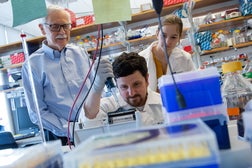UMass finds ALS gene using Ice Bucket challenge funds
 Dr. John Landers helped head up an international team of researchers that discovered a link between a gene and ALS.
Dr. John Landers helped head up an international team of researchers that discovered a link between a gene and ALS.
A professor from UMass Medical School in Worcester played a leading role in a new study that discovered a gene linked to ALS which could put scientists on the track to new therapies for the disease.
Dr. John Landers headed up an international team of researchers along with Dr. Jan Veldink of University Medical Center Utrecht, in The Netherlands, according to a release from The ALS Association. The duo coordinated the largest-ever study of familial ALS, involved contributions from over 80 researchers in 11 countries, in an effort that was funded by money from the ALS Ice Bucket Challenge donations.
"Global collaboration among scientists, which was really made possible by ALS Ice Bucket Challenge donations, led to this important discovery," Dr. Landers said in a statement. "It is a prime example of the success that can come from the combined efforts of so many people, all dedicated to finding the causes of ALS. This kind of collaborative study is, more and more, where the field is headed."
The gene NEK1 was discovered through a genome-wide search for ALS risk genes in over 1,000 ALS families, and was independently found through different means in an isolated population in The Netherlands. The research was published today in Nature Genetics.
The ALS Association is funding Dr. Landers’ lab to develop mouse models to better understand NEK1's role in disease.
ALS is a progressive neurodegenerative disease that affects nerve cells in the brain and the spinal cord. Eventually, people with ALS lose the ability to initiate and control muscle movement, which leads to total paralysis and death, usually within two to five years of diagnosis.













0 Comments